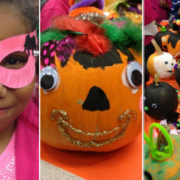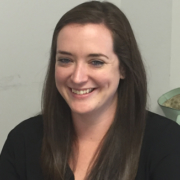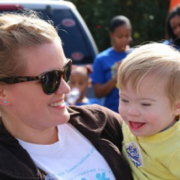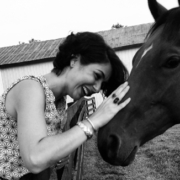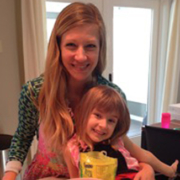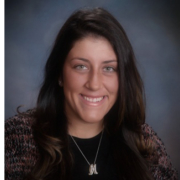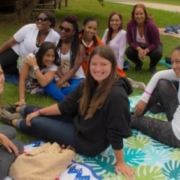Written by Foundling Guest Blogger, Stephanie Kearns, Vice President of Business Operations.
In recognition of National Special Needs Month I’ll be sharing a series of blog postings about special needs and severe allergies with the help of peer parents who live with these fears or challenges every day.
Last weekend my family and I explored the local street fair for some weekend fun and tasty treats. As the day went on I noticed my daughter was covered in angry red hives triggered by an unknown cause. My stomach jumped into my throat as I tried to remain calm for her sake and run through the checklist of things to do when your child has an allergic reaction. After rushing her home to shower her off and administer an antihistamine, the hives faded away and she went on with her merry day. It ended up being a minor allergic reaction but that split second of fear is a moment I’ll never forget like all moments when you feel helpless as a parent. This is nothing compared to the life threatening reality of severe food allergies.
My first interview was conducted with Kristen Rutter whose own child, Giuliana (age 4) is severely allergic to peanuts and tree nuts. Kristen is an attorney turned Stay-at-Home Mom.
When was your child diagnosed and how did you discover the diagnosis?
She was diagnosed right after her second birthday. She had an anaphylactic reaction within minutes of eating her first bite of peanut butter. We immediately dialed 911 and she was transported via ambulance to the hospital, where she stayed for observation for five hours after the initial reaction. She was given a shot of epinephrine, a shot of anti-histamines and was sent home with a week’s worth of steroids. Knowing what I know now about food allergies, I consider us very lucky. We are so thankful we knew enough about food allergies that we dialed 911 right away. We had follow-up appointments with her pediatrician and a board certified pediatric allergist for further food allergy testing right away.
What lifestyle changes have you made to adapt to living and raising a child with this condition?
Food allergies affect every aspect of our lives. The changes we have made are too numerous to list. The most obvious change is that we don’t keep any peanuts or tree nuts in our house. We also don’t purchase or use any products that may contain nuts or that are manufactured with nuts. We read every label of every product that we provide to our daughter and we have a strict non-sharing policy regarding food and drinks. We are very careful about where we eat out. We take our own food to many places and events including birthday parties, holiday parties, sporting events, the movies, school events and fieldtrips, etc. I make Giuliana’s lunch to take to school every single day. We have Epi-Pens in various locations including our home, grandparents’ houses, school, and a two pack in my purse at all times.
What are your biggest fears related to this condition and how do you cope?
My biggest fear is unmentionable. Food allergies are life threatening. There is no way to predict how severe a reaction will be. Every reaction has the potential to be life threatening. I am fearful that she may be bullied or made fun of because of her allergies. I am fearful that as she gets older, she might engage in risky behavior with unsafe foods because she wants to fit in. I am scared that she may not always carry her Epi-Pens with her when she starts to self-carry. My fears and concerns will change throughout her life as she enters and exits stages and ages. But my biggest fear will always remain the same. I am scared that one day, one bite could take her life.
How do you communicate the condition to other parents and caregivers, namely those parents in the child’s class or activity spaces (i.e. extracurricular activities)
I always tell teachers, instructors and other parents about her allergy and that she absolutely cannot eat or share any food or drinks with anyone. The rule is that she eats what we bring and that’s it. I will make an exception if I have spoken to a teacher or parent in advance and they have purchased and brought something that I know for a fact is safe for her, but all of that research and those conversations are conducted in advance. The rules are always clear-cut and we don’t make last minute or spur of the moment decisions. I talk about the signs of an allergic reaction and make sure that anyone who is supervising her knows what to look for, knows where her Epi-Pens are located, and knows how to administer them and what to do in the event of a reaction.
With all of the parties, celebrations, going away, welcome events, how do you ensure they are free of the allergen in question and do you take any measures to check?
The most important thing I do is call and speak to the host/hostess well in advance of the party or event. I learned to do that the hard way. There have been two occasions that I forgot to call in advance and one was a baby shower that, unbeknownst to me, was candy themed, and another was a birthday party that had PB&J sandwiches for all the kids. Both were very difficult situations to deal with. Now, I ALWAYS call the host/hostess before any event, no matter how big or small, to ask what is being served or if there is a party theme, etc. That way I make sure Giuliana has options that are safe and that make her feel included. If an event is being catered or is at a restaurant, I call the catering company or restaurant and ask them questions. I often make all of our own desserts for events and parties.
Do you have any limitations on what your child can or can’t do as a precaution from preventing an encounter with this trigger?
We do our absolute best to make sure Giuliana is included and able to participate with her family and friends in activities, events, fieldtrips, and whatever else she may be interested in. There really isn’t anything she can’t do without a little preparation, research and maybe some substitution. With planning, we have successfully managed parties, trips to the movies, play dates, school lunches, picnics, eating out, traveling, and even plane trips. We have gotten a lot of support from family and friends along the way.
Tell me an experience you have had, if any, with an uncooperative or dismissive parent who excluded your child’s from an event or activity due to her allergy?
I have heard nightmarish stories but I must say, we have never had a downright bad experience. Most uncomfortable or difficult situations have stemmed from my lack of planning in the past or from another parent’s misunderstanding or lack of knowledge regarding the severity of food allergies. I have not yet had (and hopefully will never have) an encounter with another parent who has blatantly disregarded the safety of my child or been dismissive and excluded her from something. We consider ourselves to be very compassionate people and try our best to surround ourselves with others who are compassionate and strive for the safety and inclusion of all children.
What are the common misconceptions or misunderstandings about children with serious allergic conditions? Include any inaccurate vocabulary or derogatory words.
I think there is a definite lack of understanding regarding food allergies. Even I don’t know it all! Some people don’t understand that food allergies can kill. They think that a child might just get a stomachache, or a rash when exposed to their allergen. Many people don’t understand that food allergies are different from food intolerances. I will say it again, food allergies are life threatening.
A lot of people think that the amount of the allergen eaten has a direct affect on how severe a reaction will be. For example, someone might think that putting sugar cookies on a plate next to peanut butter cookies is okay because the sugar cookies don’t contain peanuts and how could one crumb kill someone? But it’s true, even the smallest trace amount of a person’s allergen could cause a reaction. That is why you hear talk about avoiding products that don’t even contain nuts but are just manufactured on the same lines as another product that does. Also, food proteins are sticky! Using hand sanitizer will not remove peanut residue from your hands. That is also a common misconception. Proper hand washing is a must. That also goes for cleaning surfaces, dishes and utensils, as well.
What are the top 3 goodies that a parent can produce at lunches, parties, or events that ensure your child doesn’t encounter these triggers?
Non-food favors! With any treats or edible food and drink, definitely talk to the child’s parent. What I would consider safe is not necessarily what another parent would consider safe based on their child’s needs and restrictions. Non-food favors/goodies are a great way to ensure every child is safely included. Pinterest is a great resource for finding different favor/craft/party ideas based on the celebration, whether it be a birthday party or holiday. Aside from talking directly to the child’s parent in advance and including non-edible goodies, look for brands that are top-8 allergen free, like Enjoy Life Foods. And then talk to the parent about providing something like that. Did I mention, talk to the child’s parents?
What about travelling? How do you go on plane trips, hotels, or even restaurant outings and ensure your child is safe?
It takes a lot of planning but we have done all of the above successfully! We try to be as prepared as possible. I always carry safe snacks in my purse so that we are never in a bind. We take a lot of our own food. With restaurants and resorts/hotels, I call in advance and talk to a manager about their food prep practices and feel out their level of knowledge regarding food allergies. When we fly, we take wipes and ask to board planes early to wipe down the seats we are assigned to. Sometimes the flight attendants will make an announcement regarding having a passenger with a severe allergy on board and sometimes they won’t. We have experienced both scenarios. We always have two Epi-Pens with us at all times.
What are the top 3 tips you would tell parents who do not have a child with a serious allergic trigger to best accommodate a child who does?
- Talk to the child’s parent. Find out what the child is allergic to and what their family rules are regarding food and drink. Ask how you can help safely include them.
- Try new products and substitutions! There are so many substitutions for things these days, like SunButter instead of peanut butter, or rice milk instead of cow’s milk. Introduce some of these products to your non-allergic children and explain why you are doing so. Children are naturally compassionate and want to keep their friends safe. You may also find that they love a certain product that is safe for their friend with food allergies. Everybody wins.
- Do your best to safely include children with food allergies. A few weeks ago, my daughter had her blood drawn for her annual food allergy testing. It was a very rough morning and a difficult blood draw. We left the lab in tears and she was so sad, disheartened and down. Giuliana had swimming lessons afterward and when we got to the pool, a friend of ours who was there with her three boys had brought some nut-free fruit gummy snacks for the kids for after the lesson. When Giuliana asked if she could partake in the after swim treat and the other mom told her they were nut-free (and I verified of course), her whole demeanor changed. Something as simple as another mom bringing nut-free fruit gummies for the kids turned her entire day around. When you safely include a child with food allergies, you do more than just keep them safe. You make them feel loved, included and accepted.
Lastly, what are your expectations from other parents when it comes to packing lunches, carpooling, and field trips? Do you restrict your child’s attendance or blast communication and confirm everyone got the message?
I don’t expect anything. I have hope that other parents will be mindful and considerate when packing lunches. The most important thing I can do is maintain open, honest and respectful communication with other parents so that I am better able to prepare for and ensure my child’s safety in any given set of circumstances or in any given environment. So actually, yes, I suppose I do expect that: open, honest and respectful communication.
*Disclaimer: The views and opinions expressed in this article are those of the author(s) and do not necessarily reflect the official policy or position of The New York Foundling, its funders, regulators, donors and/or employees.
The information contained within this article is not intended nor implied to be a substitute for professional medical advice, it is provided for educational purposes only.
|

